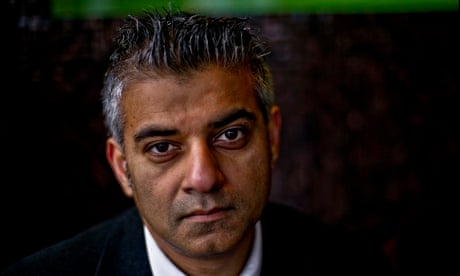The last Labour government could have done more to address the gap between rich and poor that has become the single biggest threat to the UK economy, society and personal wellbeing, the shadow justice secretary has said.
In a speech to the GMB union on Tuesday, Sadiq Khan will say the rise in inequality under the coalition is a "stain" that is getting worse, especially as senior Tories such as Boris Johnson have argued that greed is a good thing. But he will also acknowledge that the rise in inequality did not start under this government.
Khan will say the share of income going to the richest 1% has risen from 8.2% to 9.8% over the past year, with the 100 wealthiest individuals seeing their assets increase in value by £40bn. But he will also point out that Britain had the fastest rise in inequality in any developed country between 1985 and 2008. Before the speech, Khan said: "Over 13 years of government, we did many amazing things – from the national minimum wage to investing in education – but we also have to have the humility to admit that we weren't able to do enough to tackle rising inequality – and that it continued to rise under our watch."
Ed Miliband has already promised to put inequality at the heart of Labour's manifesto. The party leader has adopted policies aimed at tackling the issue including reintroducing the 50p tax rate, repeating the bankers' bonus tax, a new mansion tax, and building 200,000 homes a year.
Khan will say these measures are essential because inequality is bad for both the rich and poor, pointing out that International Monetary Fund and the Bank of England have both warned of its negative effect on the economy. It causes shorter, unhealthier and unhappier lives, as well as increasing the rates of teenage pregnancy, violence, obesity, imprisonment and addiction, he will say.
"It stops our economy from working for ordinary people. It reduces economic growth. It is the single most important factor in determining the happiness of society and the cohesiveness of our communities and it offends the basic British sense of moral fairness," he will tell GMB delegates.
The issue of inequality has risen to prominence again in political circles over the last few months following the publication of a book by the French economist Thomas Piketty. The academic's Capital in the 21st Century advances the theory that the richest are accumulating more wealth, widening the gap between the haves and the have-nots in Europe and the United States.
However, Miliband has long been concerned about the problem and chose it as the subject of his Hugo Young lecture in February, saying Labour cares about tackling inequality of income, opportunity and power.
As well as speaking on inequality, Khan's address to the GMB conference in Nottingham will contain a staunch defence of the role of trade unions in Labour. "We will need our relationship to be stronger than ever if we are to win the general election in 2015," he will say.
Meanwhile, according to
a new poll by former Tory donor Lord Ashcroft, Labour's lead is now four points over the Conservatives. The survey puts Miliband's party on 32%, down two points from last week, with the
Conservatives up three on 28%, the Liberal Democrats up two on 8% and
Ukip down two points to 17%.
Ashcroft found that David Cameron and Osborne are still more trusted on
the economy than Miliband and Ed Balls, but he said this does not
"necessarily translate into a Conservative vote". The NHS topped the
list when it came to people's personal priorities, with 57% saying it
was in their top three, ahead of the economy and jobs on 56%.
"We could be seeing early signs that as economic confidence returns,
other priorities like public services start to reassert themselves,"
Ashcroft said.

Comments (…)
Sign in or create your Guardian account to join the discussion